- Home
- Kieran Larwood
Freaks Page 9
Freaks Read online
Page 9
“What you do to my work?” Farfellini managed to croak, raising himself on one elbow. “You ruin my machines, you steal from my workshop! I call the police, you all go to jail.”
“Call the police, by all means,” said Mama Rat. “And then maybe you could explain this to them.” She waved the crab blueprint in his face, and Sheba noticed that he instantly began to tremble.
“That is nothing,” he said. “Just a design. An idea, only.”
“That’s funny,” said Sheba. “Because a machine exactly like that one there has been stealing children from the river.”
“It not prove anything . . .” Farfellini began.
“Well, shall we turn it over to Scotland Yard and see what they make of it, then?” Mama Rat said. “Or would you like to tell us exactly who you made it for?”
“I can’t tell!” Farfellini cried. He was beginning to panic. “A man come. He pay me. He not say his name.”
“Not good enough,” said Sister Moon. She pushed the sword a little harder into the soft skin of the little man’s throat.
“He was a skinny man, calvo . . . bald, with spectacles. He give me orders, but that is all, I swear to Santa Maria!”
Sheba and Sister Moon looked at each other. Mama Rat nodded at them, and Sister Moon put her sword away.
“What will you do with me now?” Farfellini asked. His face was white as a sheet.
“I have an idea,” said Gigantus. The big man had managed to get to his feet, but he looked almost as shaky as Farfellini. He wobbled across the workshop, reached down, and hoisted up the puppeteer by his throat, until the two were face-to-face.
“You and I are going for a little walk together,” Gigantus said, growling, and hauled him off the ship.
“I think we should be off, too,” said Mama Rat. “The peelers could well be on their way here after all the racket we just made.”
Sheba nodded, and they began to make their way out onto the street when she felt something heavy in the pocket of her cloak. She reached a furry little hand inside and pulled out Farfellini’s clockwork pistol. She must have tucked it in there and then forgotten about it. She thought about dropping it on the floor. After all, it wasn’t really hers. But then again, it might prove useful in a tight spot.
Finders, keepers, she thought, and slipped it back into her pocket before following the others back to Brick Lane.
A few hours later Sheba was busy showing everyone the clockwork pistol she had “found.” Sister Moon popped open the breech, showing her where the darts were loaded. There was a circular spool of little rings that held six shots. One chamber was empty, but the others still held small poisoned thorns with red fletchings, just like the one that had ended up in Gigantus’s neck.
“I can make more for you, very easy,” she said. “I even do range of poisons if you like. Some for sleeping, some for paralyzing, some for making blood come out of eyeballs.”
“Um . . . thank you,” said Sheba.
It was just then that the door opened, and a queasy-looking Gigantus staggered in. Sheba quickly hid the pistol away, guessing he probably wouldn’t want to be reminded of it. “My head . . .” he groaned, slumping into a chair. His scarred face had a definite greenish tinge, and beads of sweat covered his brow.
“You poor thing,” said Mama Rat, fetching him a cloth. “That nasty little puppet man poisoned you good and proper.”
“That poison kill normal-sized man,” said Sister Moon.
“Thank goodness you’re such a great lump,” said Mama Rat, mopping his forehead.
Gigantus moaned in agreement.
“What exactly did you do with him, by the way?” Sheba asked. She hoped it wasn’t anything too horrid.
“Mr. Farmy-flanelly is now on a one-way trip to Australia,” muttered Gigantus, holding his head in his hands.
“Transported to the prison colonies?” Mama Rat said in surprise. “How did you manage to get him into court so quickly?”
“I didn’t,” Gigantus said. “I just nailed him into a packing crate and paid someone to stick him on the next ship out there. Serves him right for shooting me with that stupid gun.”
Then he groaned again, and made a sound as though he was going to be sick. Sister Moon ran to get a bowl from the kitchen.
“Why don’t you lot go out somewhere?” said Mama Rat, looking concerned. “I think things here are about to turn a spot unpleasant. I’ll send my ratties along with you to keep you safe.”
“Right you are,” said Monkeyboy, not needing to be told twice. He was out of the front door in a few seconds, and Sheba and Sister Moon followed close behind.
“We’re best off out of there,” said Monkeyboy when they were safely on the street. “Can you imagine that huge gorilla throwing up? It’d be like a tidal wave of spew. We’d probably have drowned in half-chewed mutton.”
“Enough, Monkey,” said Sister Moon. “At least we have afternoon for ourself. Where shall we go?”
“We could go to the Great Exhibition,” suggested Sheba. “You did say we would, and I’d love to see the Crystal Palace and the big diamond.”
“Too expensive,” said Sister Moon, looking at the few coins in the pouch on her belt. “We not have three shillings.”
“What about the penny gaff down the road? They’re a steaming great heap of bum-juice but they do an afternoon show most days,” Monkeyboy said. “We’ve got plenty enough for that, and some cakes and lemonade besides.”
Sheba and Sister Moon agreed, and the three of them set off.
Sheba pulled her hood down over her eyes, and kept her hands tucked beneath her cloak. Monkeyboy had hidden his tail down a trouser leg and jammed his battered bowler hat over his huge ears. Oddly enough, Sister Moon was the one getting all the stares. Probably because she was a girl wearing trousers.
Through the door behind them, a nasty retching sound could be heard. Sheba trotted a little faster, just in case Monkeyboy was right, and a giant wave of vomit was about to chase them down the street.
Back in Little Pilchton, Sheba had read about penny gaffs in scraps of newspaper, which described them as dens of vice and criminal behavior. Officially they were cheap versions of the theater, with a range of badly performed acts that kept their rowdy audiences entertained for an hour or so. Of all the sights she had wanted to see in London, it wasn’t very high on her list.
“I’m sure going to a penny gaff will be interesting,” she said politely as they walked along Cable Street.
“You clearly haven’t been to one before,” Monkeyboy cackled.
“Where are rats?” Sister Moon asked. “I not see them.”
Sheba sniffed the air. There were scents of rodent everywhere, but then there were probably more rats in London than people.
“I think we’ve lost them,” she said.
“Good,” said Monkeyboy. “Them things give me the creeps.”
They turned onto the Ratcliff Highway. It was a seedy, dirty place, with people lying in the gutter and hordes of ragged children leaping around piles of rotting litter. The smell of disease and decay made Sheba feel sick, and she took her handkerchief out and held it to her nose.
“Lovely here, innit?” said Monkeyboy, grimacing. “Just the place for an afternoon out. Makes Brick Lane look like bleeding Mayfair.”
“This the place,” said Sister Moon. She had stopped by an ancient, timber-fronted building that looked as though it might have once been an inn. The outside was covered with pasted playbills, all too weather-stained to read.
“I’ll say it again,” said Monkeyboy. “I hope you’re not expecting anything spectacular. I don’t want the blame if it’s rubbish.”
“It be good, Monkey. You see.” Sister Moon ducked through the low door, not waiting for the others to follow. Suddenly, without a ninja to protect them
, the highway didn’t seem a very safe place for two young children to be standing. Monkeyboy and Sheba quickly followed.
They came out into a small, crowded tavern. Sheba could smell lots of unwashed bodies, pipe smoke, and gin, and also something sweet. Over in the corner she saw a makeshift bar, where a woman was selling apples and slices of unhealthy-looking cake.
Sister Moon was standing at the far doorway, beckoning. It looked as though the show was about to start. Sheba and Monkeyboy pushed through the unwashed bodies toward her. As they arrived she dropped three pennies into the hand of the doorman and they went through into the theater.
It was dark inside, and even smellier than the tavern. People were squashed into the small pit area next to the stage, and it was with difficulty that the three of them managed to push their way through to the rows of wooden benches at the back, which stretched up to the ceiling like a Roman amphitheater (if amphitheaters had been knocked together by a few drunken carpenters out of worm-eaten timber). Sister Moon grabbed hold of a wonky ladder and scampered right to the top, where she found an empty bench. Monkeyboy followed, just as agile, but Sheba found the climb difficult and not a little frightening.
After minutes of clutching the splintered rungs and praying she wouldn’t fall onto the heads of the crowd beneath, she felt Sister Moon’s hands around her wrists, lifting her up. Stress had made her claws come out, and she left little gouge marks on the top rung. They had a bird’s-eye view of the whole theater. The stage below seemed small, but at least the air was clearer up here, away from all the dirty clothes and festering armpits.
A little man came out onto the stage. There was an immediate roar from the audience, and it was very hard to hear what he was saying. It sounded as if he was boasting of the marvels of his show — a bit like Plumpscuttle did every night before their own performances.
The more the man went on, the more the crowd jeered. At one point, he compared his theater to the Great Exhibition, and the whole audience fell about laughing. He seemed to take that as the final straw, and disappeared through a trapdoor in the stage floor.
There was a brief moment of silence from the crowd, then a lady in an extraordinary amount of petticoats came on. There were wolf whistles and cheers, some rather pleasant music started — played by three men at the corner of the stage — and she began to dance.
She wasn’t the most agile or slender of dancers, unfortunately, and soon the audience in the pit were throwing things at her. Eventually, she was booed off, and the director edged on stage again to announce his next act.
“Ladies and gentlefolk, may I now present to you the scientific genius Mr. Faraday!”
The audience shrieked and booed as a man in a black suit and enormous wig of wild gray hair came on. He carried a badly painted box, covered with coiling copper wires, strange dials, and a crank handle on the side, which he placed on a small table and pretended to tinker with.
“What’s a scientific genius doing in a place like this?” Sheba shouted into Sister Moon’s ear, trying to make herself heard over the noise.
“It not really him,” Sister Moon yelled back. “Is actor. Is famous because of new invention.”
Sheba was about to ask what he had invented, but the performance onstage soon made it clear. As he turned the handle, his box exploded with a bang and the actor jittered about the stage as if being shocked, before collapsing in a smoking heap. The crowd threw empty bottles and apple cores at the stage, forcing the man to scramble away on all fours.
“He made something electric, did he?” Sheba thought of the board of levers and wires on Farfellini’s ship.
“He very clever scientist,” said Sister Moon. “You not heard of him?”
Sheba shrugged, not knowing how to explain the patchy nature of her general knowledge. As soon as I get a chance, I’m going to buy myself an encyclopedia, she thought.
When the interval came, Sheba was rather relieved. Monkeyboy went off to get some cake for them all, leaving her to enjoy the relative peace and quiet.
“Is something the matter, Sheba?” asked Sister Moon. “You not like the show?”
“It’s all right, I suppose,” said Sheba. “Not my sort of thing, really.”
“Yes. In Japan we have theater called kabuki. It more civilized than this.”
“Do you miss your home?” she asked. What had driven the young girl so far from her native country?
“A lot, yes.” Sister Moon looked suddenly very sad.
“I’m sorry,” she said. “I didn’t mean to remind you.”
“Don’t worry,” Sister Moon forced herself to smile. “I cannot go back there, so I must get used to the sadness.”
“Why not?” asked Sheba. “Why can’t you return?”
Sister Moon paused for a moment, thinking. Obviously this was something serious, and she was wondering whether to trust Sheba or not. When she spoke again, Sheba felt a rush of affection — that she had been deemed worthy to share Sister Moon’s secret.
“In Japan I do bad things, Sheba. Things I not proud of.” She halted, looking around to see if anyone was listening. When she next spoke, it was almost in a whisper.
“I work for a group called Shadow Fist. We belong to powerful shogun as ninja . . . assassin. My master, he train me for many years, make me the best of all his ninja. But then one day he give me new task. He ask me to kill daughter of rival shogun. A girl not much younger than me.”
Sister Moon stopped, pressed her hands to her eyes for a moment. Sheba put an arm around her and squeezed gently.
“I refuse,” said Sister Moon. “I refuse mission. Bring disgrace to Shadow Fist. In my country, if you do such a thing, is terrible crime. My master would have had to kill me. So I leave. Get on first boat and come here. Monkeyboy and Gigantus find me in Whitechapel, save me from attack by gang. Mama Rat persuade Plumpscuttle to take me.”
For a moment, Sheba didn’t know what to say. Finally, she took one of Sister Moon’s hands in hers.
“You poor thing,” she said. Then, because that sounded so hopelessly inadequate: “Your master, he sounds like a horrid man. It’s good that you got away from him.”
“He horrid man . . . but . . . he my father.”
There was an awkward silence, broken by Monkeyboy returning with the cake.
“What’s going on here?” he said. “Heart-to-heart, is it? Has Moonie told you her sad story?”
“Shut up, Monkeyboy,” said Sheba. She didn’t mean to be so harsh, but she was feeling responsible for opening Sister Moon’s old wound, and also dredging up thoughts of her own lost family.
“Wait till you hear my story, then. It makes hers sound like a comedy.” Monkeyboy finished his mouthful of cake and handed the rest around. Then he cleared his throat, as if about to launch into a performance of his own.
“I was born on a boat, I was,” he said. “A transportation ship, on its way back from Australia with those what had served their time. My mam was aboard, heavy with child (which was me, of course). They were just passing the Isle of Wight when she gave birth. A strange little thing with a tail. Everyone screamed in terror and thought it was a bad omen — the ship was going to sink and all that — so they wrapped me up and threw me overboard.”
Sheba wasn’t sure whether to believe any of this. She looked across at Sister Moon, who appeared to be taking it seriously.
“Days and nights I must have drifted on the sea, until I washed up on a Cornish beach. The local tavern keeper took me in, and that’s where I grew up. Hanging in a cage and forced to sing rude limericks to all the pirates and smugglers. And I’d be there still, if old Plumpscuttle hadn’t come by one day. Just lost his fortune when his boat sank on the way back from America. Bet all he had left on a game of blackjack and won the jackpot . . . me! I was his first freak, I was. Just goes to show, when one door closes, ano
ther one opens.”
Monkeyboy bowed as if he’d just done a penny gaff act of his own.
“Were you really his first freak?” Sheba asked.
“I certainly was!” Monkeyboy reached across and took her uneaten piece of cake, cramming it into his mouth in one go. “He had a couple more after me: a grumpy little dwarf and some bloke who said he was older than Julius Caesar. They didn’t hang around for long, though. Then he found Mama Rat and Gigantus, straight off a boat from France, and the rest is history!”
Sheba wanted to ask more — such as, what were Mama Rat and Gigantus doing in France? — but the audience had started shrieking again. It was time for the main performance, which turned out to be some kind of bizarre story of a man who kept escaping from prison by tying bedsheets together and picking locks. He wasn’t even doing it right, Sheba noticed in disgust.
“What’s all this about?” she asked as the hero was being chased around the stage by an angry mob.
“Story of Jack Sheppard,” said Monkeyboy, “most famous jailbreaker in the world. Robbed from the rich, broke the hearts of half the dollymops in London, and escaped from every lockup they held him in. Nobody ever told him what to do. My hero.”
It was all about as well acted as a Punch and Judy show, but the crowd seemed to love it. They whooped and cheered so loudly it made Sheba’s ears ring. Monkeyboy was actually doing backflips of excitement on the bench next to her.
Then it was all over. The roars began to subside and everyone suddenly stood up.
“We go now,” Sister Moon said. “Owner cross if you not get out quick. They want to make room for next audience. Take more money that way.”
Sheba noticed the director had returned, this time with a pair of very large bouncers. The rest of the crowd was making for the door as fast as the crush allowed.
With Sister Moon helping, Sheba scrambled down the ladder as quickly as she could. The three of them plunged into the throng and, holding hands tightly, were somehow swept along, through the door and into the street outside.

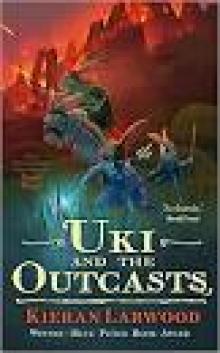 Uki and the Outcasts
Uki and the Outcasts Uki and the Swamp Spirit
Uki and the Swamp Spirit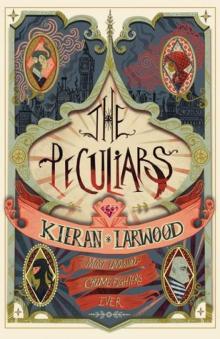 The Peculiars
The Peculiars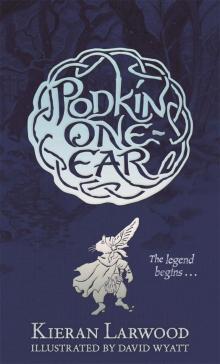 Podkin One-Ear
Podkin One-Ear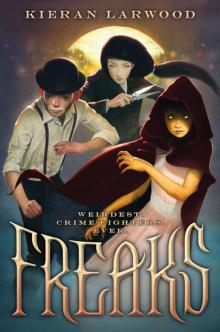 Freaks
Freaks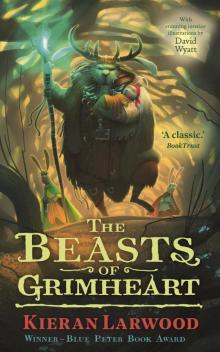 The Beasts of Grimheart
The Beasts of Grimheart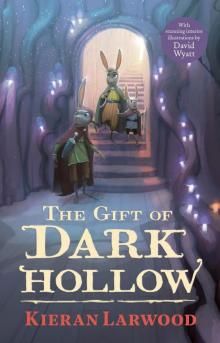 The Gift of Dark Hollow
The Gift of Dark Hollow